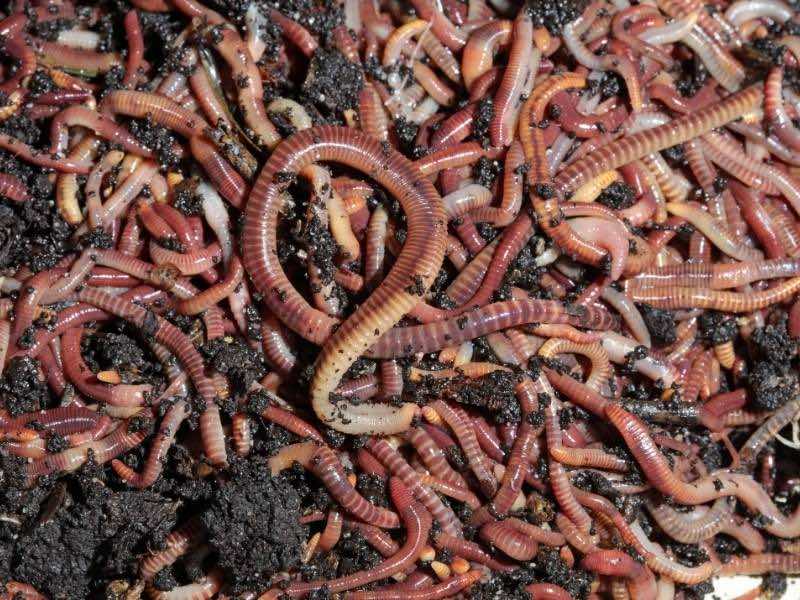Thinking of what compost worms to buy for your homestead? To help you pick, we listed the four best types of worms. These are guaranteed to compost your food scraps fast and easy. Plus, these worms are very affordable and easy to grow. Check them out below.
RELATED: How To Compost [INFOGRAPHIC] | Homesteading Composting Guide
Different Types of Compost Worms
1. The Red Wiggler Worm
The red wiggler is the most favorite type of a lot of homesteaders. They are common to find and are also very affordable.
Every day, these worms can eat as much as half of their total body weight. And, they can eat almost any type of food scraps. They can also efficiently break down decaying organic remains and turn them into high-quality compost in a short time.
A lot of homesteaders also acknowledge red wigglers as the prolific type. They love to mate especially during warm weather conditions. Also, these worms can grow as long as one to five inches in length, and a quarter of an inch in width.
2. The Georgia or Alabama Jumper
The Alabama Jumper or the Amynthas Gracilis, are native to Asia. They work well in composting in tropical and subtropical areas. Also, they can stand really hot temperatures ranging from 45 to 90 degrees Fahrenheit.
One fun trivia about the Alabama Jumpers is that they can grow larger than other worm species. They can reach up to four to six inches in length. They can also break down organic scraps very fast. They eat, eat, and eat, so you might have to load them with your kitchen scraps every week.
Although on the downside, Alabama jumpers can quickly escape from their worm bin. They go up to the surface to eat and can attempt to jump their way out of the bins. So, you mustn't accidentally leave the lid open. Similarly, reports from the Chicago Tribune shared that some homesteaders found their Alabama jumpers to help compost, but can be very invasive once they escape the bins.
3. European Nightcrawler
European nightcrawlers are also known as Eisenia Hortensis. These nightcrawlers are similar to the red wigglers because they are also easy to raise and reproduce. At the same time, according to Wikipedia, these worms can grow much larger like the Alabama Jumper. These nightcrawlers can grow almost as big as worms that you can use for fishing. When fully grown, their average height is around four inches and can weigh around 1.5 grams.
RELATED: A Homesteader’s Guide to Composting | How To Compost Tutorial
4. African Nightcrawler

These African nightcrawlers are also known as Eudrilus eugeniae. Similar to the Alabama Jumper, they are also tropical worms. They love high temperatures and will not thrive in places with temperatures under 50 degrees Fahrenheit. If you live in states like Texas, Arizona, and Florida, this worm may be the best choice for you.
They will thrive in really hot conditions, but always remember to give them enough moisture and water. They can also consume a lot of organic scraps fast, so you may need to feed them every one or two weeks.
Vermicompost is rich in vitamins and minerals, such as potassium, phosphorous, and nitrogen. It also contains more microbes that can help your plants grow faster. This type of soil is also more porous as compared to traditional compost. This means that vermicompost can absorb more water for plant roots.
It is very easy to create a worm farm. You can place the bins indoors to protect the worms from extreme weather conditions. They are easy to maintain and does not need to be checked out every day. To grow the worms, you would only need to feed them with organic scraps once every week or every other week.
If you want to learn how to create your own worm composting bins, check out this video by Epic Gardening:
Just a reminder, you should avoid feeding your worms animal bones, dairy products, and woody items like twigs. They will have a hard time digesting such foods. Plus, dairy products can cause a pungent odor. And to be extra safe, during the first few days of creating a worm bin, observe what the worms are eating or avoiding.
Have you tried vermicomposting? What worm did you use? We'd love to know your experience. Comment down below.
UP NEXT:
- The Essential Benefits Of Worm Farming | Homesteading For Beginners
- 45 DIY Compost Bins To Make For Your Homestead
- How To Raise Ducks For Eggs | 10 Tips & Tricks
Fellow homesteaders, do you want to help others learn from your journey by becoming one of our original contributors? Write for us!

I was truly intrigued by your insights on how earthworms can improve soil structure and foster plant growth. As someone new to gardening, I’m eager to delve into the world of worm-casting compost to benefit my plants. I’ll be actively seeking a supplier for worm castings in the near future.
Warm regards,
B.Sc Ag(Hons)
MSc. In Agronomy
Bangladesh Agricultural University